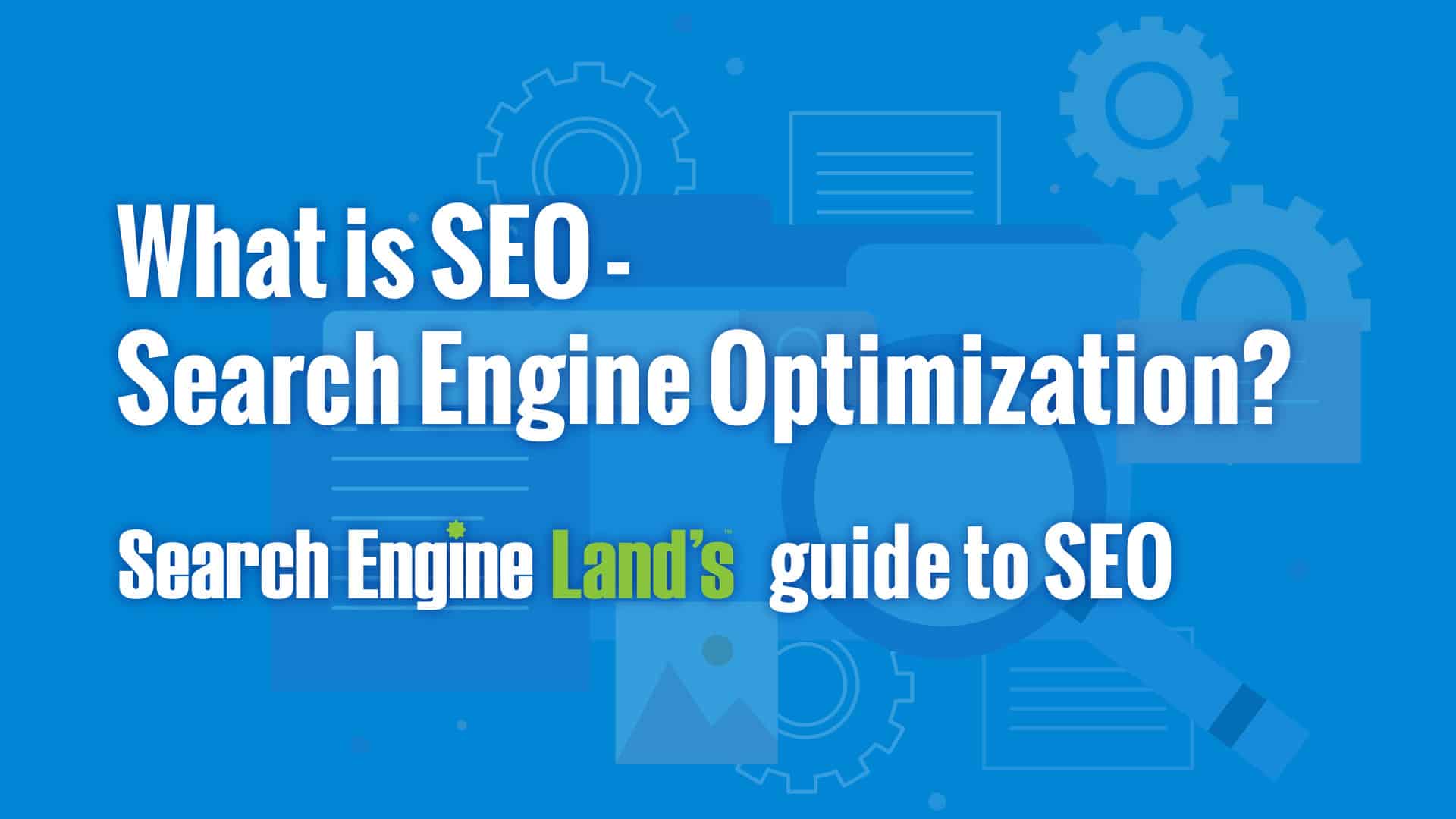Firm Chronicles: Introducing Victories in the Evolving Landscape of SEO
SEO Vs. SEM: Comprehending the Trick Distinctions
SEARCH ENGINE OPTIMIZATION, which stands for Look Engine Optimization, focuses on boosting a website's visibility and organic position on search engine results web pages. On the other hand, SEM, or Search Engine Advertising and marketing, includes paid marketing to boost a web site's exposure on search engines. Understanding the key differences between Search engine optimization and SEM is important for services looking to maximize their on-line existence and drive web traffic to their web sites.

Definition of SEO
SEARCH ENGINE OPTIMIZATION, or Search Engine Optimization, describes the technique of optimizing websites to improve their exposure and rankings on search engine results pages (SERPs) It involves different strategies and strategies targeted at enhancing natural, or non-paid, website traffic to an internet site. The ultimate goal of SEO is to improve a site's on-line existence and bring in even more targeted site visitors.
Among the crucial aspects of search engine optimization is keyword optimization (https://buzzingglobe.com/news/linkdaddy-announces-agency-backlink-local-business-directory-listings-service/458323). This includes carrying out detailed research to recognize relevant search phrases that users are likely to look for when searching for information or products connected to a specific site. By including these keywords purposefully right into the internet site's material, meta tags, and Links, SEO intends to boost the site's significance and ranking for those certain search terms
An additional crucial factor in SEO is on-page optimization. This includes optimizing different components on a web site, such as title tags, headings, photos, and interior links, to make them even more search engine-friendly (seo). By making sure that these components are correctly structured and pertinent to the internet site's content, SEO aids browse engines comprehend the context and relevance of the website
In addition, search engine optimization likewise includes off-page optimization techniques, such as web link structure. This entails getting premium back links from other credible sites, which suggests to look engines that the site is credible and reliable. By building a solid network of backlinks, SEO boosts an internet site's credibility and increases its chances of ranking greater in search results.
Meaning of SEM
SEM, or Look Engine Marketing, is an advertising and marketing method that includes advertising internet sites and increasing their visibility through paid advertising on internet search engine results pages (SERPs) Unlike SEO, which concentrates on enhancing internet sites to enhance organic search positions, SEM uses paid marketing to drive website traffic to a website.
Among the vital elements of SEM is pay-per-click (PAY PER CLICK) advertising. With PPC, marketers quote on search phrases that pertain to their target market. When a user searches for those keywords, the advertisements show up on top or side of the search engine result. Marketers only pay when an individual clicks their ad, therefore the term "pay-per-click."

Present advertisements are banners or aesthetic advertisements that appear on websites within the Google Show Network. Remarketing advertisements target individuals that have formerly seen a site, serving them advertisements as they search various other sites.
Objectives of SEO and SEM
The goals of both search engine optimization (SEO) and online search engine advertising and marketing (SEM) revolve around increasing a site's visibility and driving targeted web traffic. The approaches and techniques utilized by each vary significantly.
The major goal of search engine optimization is to boost a site's natural search ranking on search engine results pages (SERPs) This is attained by enhancing different elements on the web site, such as web content, meta tags, and website structure, to make it much more appropriate and enticing to online search engine. By doing so, SEO aims to draw in even more organic website traffic from users actively looking for related key phrases or topics.
On the other hand, SEM focuses on enhancing a web site's exposure with paid advertising on search engines. The primary goal of SEM is to drive targeted website traffic to an internet site by bidding on keywords and presenting ads in internet search engine results. This strategy permits businesses to get to a broader audience quickly and effectively.

Key Components of Search Engine Optimization
To successfully implement SEO, it is vital to understand the key parts that add to boosting a site's natural search position. These elements can be generally categorized right into off-page variables and on-page elements.
On-page factors refer to the aspects that are directly present on an internet site and can be optimized for better online search engine exposure. This consists of the web site's content, keyword use, meta tags, link framework, page titles, and headings. By enhancing these elements, search engines can better comprehend the relevance and context of the internet site's material, leading to higher rankings.
Off-page aspects, on the other hand, emphasis on outside signals that influence a website's authority and credibility. This includes back links from other trustworthy sites, social media signals, and on-line discusses (https://money.buzzingasia.com/news/linkdaddy-announces-agency-backlink-local-business-directory-listings-service/458323). The even more relevant and high-quality back links a site has, the better its chances of placing greater in online search engine results pages
In addition, individual experience is an important element of SEO. seo audit. Internet search engine focus on internet sites that use a favorable user experience, consisting of rapid loading times, mobile-friendliness, and simple navigating
Key Parts of SEM
In comparison to SEO, SEM includes a distinct set of crucial parts that focus on paid marketing and driving prompt presence in search engine results. These components include online search engine marketing, likewise referred to as pay-per-click (PAY PER CLICK) advertising and marketing, keyword research, ad creation, and campaign management.
Internet search engine advertising and marketing is a crucial part of SEM. When those search phrases are looked, it includes bidding on keywords relevant to your service and producing message or screen advertisements that will certainly show up in search engine results. With online search engine advertising, you can target certain demographics, places, and also time of day to reach your preferred audience.
Keyword study is one more essential component of SEM. It entails identifying the search phrases that your target audience is making use of to look for solutions or products similar to yours. By performing extensive keyword study, you can optimize your ads and ensure they are shown to the ideal individuals at the correct time.
Ad development is the procedure of creating engaging and persuasive advertisements that will certainly tempt users to click them. Well-crafted ads have a solid call-to-action, relevant messaging, and a clear value recommendation.
Last but not least, project management involves monitoring and enhancing your SEM campaigns to ensure they are doing properly. This consists of monitoring metrics such as click-through rates, conversion rates, and return on investment (ROI) to make data-driven decisions and achieve the most effective outcomes.
Verdict
Search engine optimization focuses on enhancing internet sites to boost natural search positions, while SEM entails paid advertising to enhance visibility on search engine results pages. Understanding the distinctions in between Search engine optimization and SEM is crucial for businesses to create a comprehensive online marketing strategy.
SEARCH ENGINE OPTIMIZATION, which stands for Look Engine Optimization, concentrates on boosting an internet site's presence and organic position on search engine results web pages. On the other hand, SEM, or Search Engine Marketing, involves paid advertising and marketing to raise an internet site's visibility on search engines (seo specialist).SEO, or Search Engine Optimization, refers to the method of optimizing internet sites to enhance their visibility and positions on search engine results pages (SERPs)The primary goal of Search engine optimization is to improve an internet site's organic search position view website on search engine results pages (SERPs) Search engine optimization concentrates on optimizing web sites to improve natural search rankings, while SEM includes paid advertising to boost presence on search engine results pages